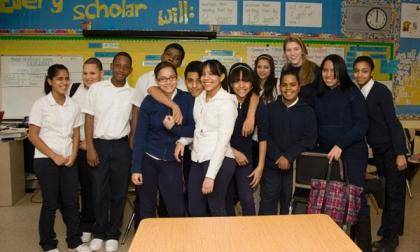
Once again, Duke is among the top providers of recent graduates accepted into Teach For America, the 21-year-old program that places former students into disadvantaged public schools for two-year teaching stints.
This year, Duke had 53 students accepted into the program, which ranks 4th among mid-sized schools (3,000-9,999 undergrads), according to figures TFA released Monday. Sixteen percent of the Class of 2011 applied (about 250 students). Ahead of Duke in this category are Harvard University (66), Boston College (56) and Georgetown University (54). The top overall school is the University of Michigan-Ann Arbor (119).
In 2010, 51 graduating Dukies were accepted into Teach For America, second to Northwestern University (57) among similar-sized schools. More than 430 Duke alumni have taught through TFA since it launched in 1990.
The reasons behind Duke graduates' continued interest in serving through TFA vary: Duke's mission of "knowledge in the service of society" fits well with TFA's mission; Teach For America seeks competitive leaders who want to make a positive impact in the world, a common trait among students at Duke and other top schools; TFA provides good career experience; and it offers a compelling employment option in a tough job market.
"The students they are recruiting are not necessarily interested in teaching for the next 19 years, but are really interested in equity and change, and in service, and that fits our student profile quite well," says William Wright-Swadel, executive director of Duke's career center.
"We have a lot of students who are very interested in policy, who are very interested in having an impact today, tomorrow and for a long time."
For Durham native Anna Jacobi T'07, TFA not only enabled her to help young people; the experience transformed her.
"I cannot begin to describe how much Teach For America pushed my limits and forced me to grow and mature," says Jacobi, who taught at a middle school in the Washington Heights district of New York City.
Jacobi says she became interested in teaching after hearing about TFA during her freshman year, and through classes she took in Duke's Program in Education.
TFA has grown tremendously since its launch in 1990, with operating revenue rising from $39.5 million in 2005 to around $200 million today. It recently received $100 million from four philanthropic groups, which it used to create a $100 million endowment that will help ensure the organization's long-term sustainability and strengthen recruitment and training, says Jennifer Peddycord, TFA's North Carolina recruitment director.
But the growth of the program concerns some education experts, who are not entirely sold on TFA as a solution for bolstering the quality of public schools.
"TFA is a huge success story, but there is also something scary about seeing so much money and power assembled around its core belief that a brand-new college graduate with only five weeks of training is just right to educate our nation's most vulnerable students," wrote Diane Ravitch, an education historian at New York University, in an Education Week blog in February.
Ravitch argues that teacher attrition is the biggest problem facing public schools, noting that half of those who enter teaching leave the profession within five years.
"These are terrible statistics. We need a stable teaching profession, not a revolving door. We need to recruit new teachers who plan to stay in teaching and make a career of it."
But TFA says the program's role since it began is not only to supplement teaching roles, but to inspire future leaders in education and to "build the movement to eliminate educational inequity by enlisting the nation's most promising future leaders in the effort," according to a TFA press release.
While only one in six corps members said they were interested in the teaching profession before joining TFA, the group says nearly two-thirds of its alumni remain in the field of education, while many others advocate for public schools.
"Teach For America selects individuals who are deeply committed to ending the injustice that a child's zip code determines their educational and life prospects, and research shows our corps members are having a remarkable impact in their classrooms," Peddycord says. "Teach For America has created a talent pipeline in education for over 20 years, and it's exciting to see that two-thirds of our nearly 24,000 alumni continue to work full-time in education."
Jacobi is one of them. She has moved to California to teach fifth grade in Richmond, located in the Bay Area. This fall she will also begin work on a master's degree in social welfare at the nearby University of California at Berkeley.
"Teach For America is an incredible program fighting for social justice," she says. "In whatever way you chose to get involved, be it through Teach For America or otherwise, being involved is the important thing."